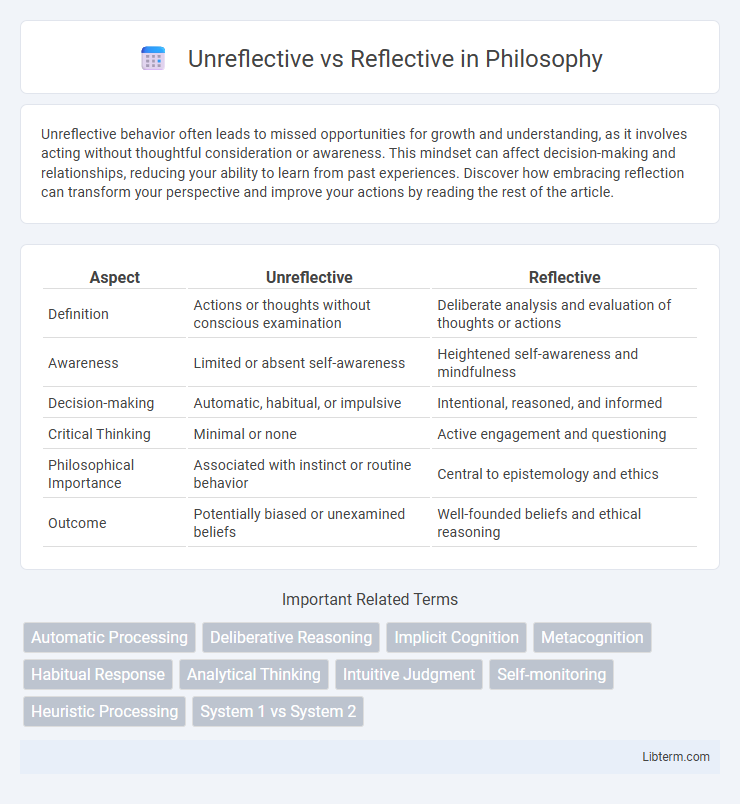Unreflective behavior often leads to missed opportunities for growth and understanding, as it involves acting without thoughtful consideration or awareness. This mindset can affect decision-making and relationships, reducing your ability to learn from past experiences. Discover how embracing reflection can transform your perspective and improve your actions by reading the rest of the article.
Table of Comparison
| Aspect | Unreflective | Reflective |
|---|---|---|
| Definition | Actions or thoughts without conscious examination | Deliberate analysis and evaluation of thoughts or actions |
| Awareness | Limited or absent self-awareness | Heightened self-awareness and mindfulness |
| Decision-making | Automatic, habitual, or impulsive | Intentional, reasoned, and informed |
| Critical Thinking | Minimal or none | Active engagement and questioning |
| Philosophical Importance | Associated with instinct or routine behavior | Central to epistemology and ethics |
| Outcome | Potentially biased or unexamined beliefs | Well-founded beliefs and ethical reasoning |
Understanding Unreflective and Reflective Thinking
Unreflective thinking involves automatic, habitual mental processes that occur without conscious awareness or critical evaluation, often leading to quick judgments with minimal analysis. Reflective thinking engages deliberate, conscious examination of ideas, allowing individuals to evaluate assumptions, consider alternatives, and develop deeper understanding. Understanding the distinction between unreflective and reflective thinking is crucial for enhancing decision-making, problem-solving, and learning outcomes across academic and professional contexts.
Key Differences Between Unreflective and Reflective Approaches
Unreflective approaches involve automatic, habitual actions without conscious examination, while reflective approaches engage critical thinking and self-assessment to evaluate experiences and decisions. Key differences include the depth of thought, with unreflective methods lacking introspection and reflective methods fostering awareness, learning, and adaptive change. Reflective practices enhance problem-solving and personal growth by promoting deliberate consideration, unlike unreflective behaviors that may lead to repeated mistakes and limited insight.
Characteristics of Unreflective Behavior
Unreflective behavior is characterized by automatic, habitual actions performed without conscious thought or self-awareness, often leading to impulsive decisions and repetitive mistakes. Individuals exhibiting unreflective behavior tend to overlook the consequences of their actions and show resistance to feedback or change. This lack of introspection limits personal growth and problem-solving abilities, impacting emotional regulation and social interactions.
Traits of a Reflective Mindset
A reflective mindset exhibits traits such as self-awareness, critical thinking, and a willingness to learn from experiences. Individuals with this mindset consistently analyze their thoughts and actions to improve decision-making and problem-solving skills. This approach fosters personal growth and adaptability by encouraging open-mindedness and thoughtful evaluation of different perspectives.
The Psychological Basis of Reflection
The psychological basis of reflection lies in metacognition, which enables individuals to analyze their thoughts, emotions, and actions critically. Reflective individuals engage in self-awareness and introspection, allowing deeper understanding and adaptive learning from experiences. Unreflective behavior, by contrast, involves automatic processing without conscious evaluation, limiting personal growth and decision-making efficacy.
Benefits of Practicing Reflective Thinking
Practicing reflective thinking enhances critical analysis, leading to improved decision-making and problem-solving skills by fostering deeper understanding of experiences. It promotes self-awareness and emotional intelligence, allowing individuals to recognize biases and adapt behaviors effectively. Reflective thinking also supports continuous personal and professional growth by encouraging learning from past actions to optimize future performance.
Common Situations for Unreflective Responses
Unreflective responses often occur in high-pressure environments where quick decisions are needed, such as emergency situations or fast-paced work settings. Routine tasks and habitual interactions also frequently trigger unreflective behavior, as individuals rely on automatic thinking to save cognitive resources. Stress, fatigue, and distractions further contribute to unreflective responses by limiting the mental capacity for careful consideration.
How to Cultivate Reflective Habits
Cultivating reflective habits involves setting aside dedicated time daily for self-examination and journaling thoughts to increase self-awareness. Engaging in mindfulness practices like meditation enhances the ability to observe experiences without immediate judgment, fostering deeper understanding. Seeking feedback from peers and mentors also promotes critical thinking and encourages continuous personal and professional growth.
Impact on Decision-Making: Unreflective vs Reflective
Unreflective decision-making often leads to impulsive choices driven by immediate emotions or habitual patterns, increasing the risk of errors and overlooking long-term consequences. Reflective decision-making involves careful analysis and consideration of different perspectives, resulting in more informed, deliberate, and effective outcomes. Studies show that reflective thinkers exhibit higher problem-solving skills and adapt better to complex or uncertain scenarios, enhancing decision quality and personal growth.
Enhancing Personal Growth Through Reflection
Engaging in reflective practices significantly enhances personal growth by allowing individuals to analyze experiences deeply and derive meaningful insights. Unreflective approaches often lead to repetitive mistakes and stagnation, whereas reflection fosters self-awareness, critical thinking, and adaptive learning. Regular reflection cultivates emotional intelligence and resilience, essential for continuous self-improvement and effective decision-making.
Unreflective Infographic

 libterm.com
libterm.com